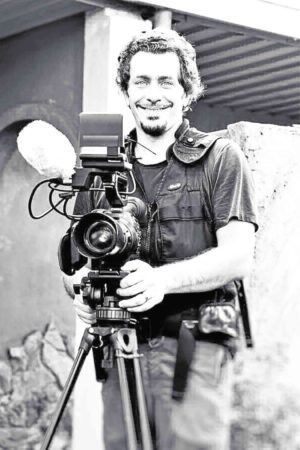National artists, Filipino auteurs among honorees of Inquirer Indie Bravo! Awards, Year 9
Winning prestigious awards abroad has become a constant source of pride and joy in this film-loving and moviegoing country.
This is why the hardworking team behind the Inquirer Indie Bravo! Awards, composed of project director Marinel Cruz, Jennifer Santillan-Santiago, Oliver Pulumbarit, Allan Policarpio, Belle Bondoc-Roberto and video editor Tcel Maramag, believes that the skill and hard work of our film practitioners deserve to be acknowledged
—and celebrated.
Nope, not because “international standards” are better than “Pinoy standards,” but because acclaimed Filipino productions show the country in a flattering light and shine the spotlight on our unique stories as a people.
But, like the indie films that the Inquirer champions, the Indie Bravo! Awards isn’t afraid to shake things up as we continue to refine our selection process.
As with the past years, it’s impossible to give every single film fest winner an Indie Bravo! trophy, because there are simply too many of them.
So, we have to be as inventive as we are judicious with our choices.
Starting this year, we also won’t be handing out awards to previous winners who won more awards abroad for the same category, to give those who have yet to receive an Indie Bravo! award a chance.
So, while we are thrilled about “First Sem’s” award-winning romp or Allen Dizon’s latest of many best actor awards for “Bomba”—like his win in Dhaka in January—we have to give the slot to other similarly deserving awardees.
Also, films with multiple winners, like Carlo Obispo’s “1-2-3” and Loy Arcenas’ “Larawan,” will be sharing one award.
This year, we’re proud and thrilled to field a list that includes top Filipino auteurs
—like Lav Diaz for “Panahon ng Halimaw” and Brillante Ma Mendoza for “Alpha: The Right to Kill”—who continue to examine brave, bold themes that mirror the country’s current realities.
Also on our list are newly conferred National Artist for Film Eric de Guia (aka Kidlat Tahimik) and National Artist for Music Ryan Cayabyab.
To add more glitz and glam to this year’s honor roll, Mendoza, Diaz, Cayabyab and De Guia will be joined by heartthrob Ian Veneracion and veteran Odette Khan.
Indie Bravo! is also expanding its reach by introducing a special award for non-Filipino filmmakers who tackle distinctly Pinoy themes—and this year, that’s Italian Andrea Capranico, for “The Landscape Within.”
We are proud to announce this year’s Inquirer Indie Bravo! awardees.
The winners are:
LIST OF AWARDEES:
For Timothy Castillo, who scored a best actor nod for his career-boosting portrayal in Mikhail Red’s “Neomanila” at the 34th Los Angeles Asian Pacific Film Festival in Southern California in the United States, every performance comes with risks.
In fact, one of “Neomanila’s” important sequences became as hairy a situation as many of the movie’s exhilarating twists and turns as the production was rushing to finish some scenes.
“While filming a crucial shooting scene for the film, I suddenly heard loud ringing in my ear,” Tim recalled. “I was near the firing zone, where one of the blanks were fired. For a few moments, I was frozen, realizing that a bullet could have hit me! Good thing the scene was done right after the shot.”
Asked about what his award meant to him, the young actor replied by pointing out the indispensability of inspiration and collaboration in the filmmaking process. “Awards like this encourage professional and aspiring actors alike to do their best as they help realize the director’s vision for the film. It is our job to share and disseminate these stories the best way we can.” —RITO P. ASILO
For Laila Ulao, acting in “Women of the Weeping River” was like revisiting a dark chapter of her own colorful story.
Laila, who won the best actress plum at the inaugural edition of the Asean (Association of Southeast Asian Nations)-China Film Festival in Putrajaya, Malaysia, for her performance in Sheron Dayoc’s award-winning film, recalled, “Some situations depicted in the story also happened to me in real life, so it was easy for me to relate to the character I played.
“The film felt so real to the point that it brought back the past and the pain. It was very hard for me to control all of the emotions required for my scenes. What I did was remind myself of the present … that I was in the present.
“Later on, I realized that the film has become a cathartic outlet for me. It was like therapy, I was relieved of emotions I’ve been hiding for so long.”
But the significance of the Mindanao-set production wasn’t just personal for Laila. “I’m just so happy and proud that a halal film from our place was given a huge recognition. It was a huge honor to our tribe. More importantly, the film allowed us to share our story, that this side of southern Philippines has this real story that needs to be told. Even with the rise of social media today, I still feel like there aren’t enough platforms for halal films out there.
“There has been a lot of prejudice against the Moro people over the years, but through this film, I hope we can shine a new light on the fact that we are just like everybody else. We have stories to tell, and we deserve to live a good life. With or without award is OK, as long as we’re able to make an impact through ‘Women of the Weeping River.’” —RITO P. ASILO
The biggest stumbling block for the career-making performance of Mary Joy Apostol in Mikhail Red’s Tokyo fest-winning coming-of-age drama “Birdshot” wasn’t really the complexity of the role; it was her character’s age.
“I was 17 years old when I played 14-year-old Maya—and, initially, it showed,” Mary Joy admitted. “It certainly looked like I was more mature than what the role required. My acting coach Bombi Plata and I had our work really cut out for us. So, we worked hard to make the character believable, because we needed to convey her innocence. And I think we were able to pull it off.”
The young actress had another problem to hurdle: She had to shuttle between acting and school work. “I was still in school at the time,” she disclosed. “I had to shoot for 16 straight days, so I missed a lot of school activities—quizzes, exams, etc. You can imagine how relieved I was when I was finally able to catch up with the school work I missed! But, I would have been heartbroken if I didn’t get to do ‘Birdshot’ at all.”
Mary Joy owes the acting opportunities coming her way to “Birdshot.” She added, “Now, I’m getting offered characters that I never would have been considered for if I didn’t play Maya. That is why I’m thankful to Direk Mikhail Red and [producer] Pamela Reyes for entrusting the role to me. It’s a blessing that is greatly appreciated.”—RITO P. ASILO
It was a big year for Raymund Ribay Gutierrez’s short film, “Judgement.” It bagged the Silver Star for Short Film Award at the 2nd El Gouna Film Festival in Egypt last September. His project also won best short film at the 2018 Stockholm International Film Festival last month.
Gutierrez is the first Filipino director and screenwriter to compete for the Palme d’Or twice in the short film category at the prestigious Cannes film fest—first, for “Imago” (2016), then this year for “Judgement,” about a battered wife who files a case against her abusive husband.
The acclaimed short, starring Max Eigenmann and Kristoffer King, is inspired by the increasingly alarming environment that the director is familiar with, where spousal abuse is “rampant” and not addressed seriously.
Gutierrez, whose mentors include auteur Brillante Ma Mendoza and scriptwriter Bing Lao, had his share of challenges while helming “Judgement.” But, he stresses that he was able to hurdle them through teamwork.
“The only thing that burdened me while doing this film was the physical stress, when I had to wake up early and pack up late,” says the 20-something graduate of Mendoza’s first film workshop. “I enjoyed doing this film with my friends, who are now doing very well at their respective artistic endeavors.”
On his various international accolades, the young filmmaker constantly reminds himself of the reason why he continues to pursue filmmaking: “Every award is important because it proves that I’ve done a good job. Having said that, that shouldn’t be the only purpose for doing a film.” —OLIVER PULUMBARIT
It was difficult to get the CineFilipino fest winner “Gusto Kita with All My Hypothalamus” off the ground, according to filmmaker Dwein Baltazar, who also helmed “Mamay Umeng” in 2012.
“The hardest part was finding other people who believe in the material, not to mention my vision,” Baltazar tells the Inquirer. “Since 2010, I’ve been pitching ‘Hypothalamus’ to film festivals like Cinemalaya, Cinema One Originals, etc. In 2016, QCinema offered us a million-peso grant, which wasn’t enough to fund it, so we had to pull out of that competition.”
On the film’s seven-year struggle, she relates, “You have to be obsessed and a little romantic to keep on ‘fighting.’ I was madly in love with the material. I knew it was something fresh, even ‘dangerous,’ if we are to believe the Cinema Evaluation Board’s assessment of the film! It’s the first script that I felt was truly mine.”
Her film, which follows the lives of four men in Manila, won the Netpac (Network for Promotion of Asian Cinema) award, and the Asian Film Observatory prize, both at the Taipei Golden Horse Film Festival last month.
“What matters more are the accolades from grant-giving festivals because they’re the first people who believed in it,” she says. “Also, it’s more important that my coworkers get awards, as well. It’s like giving back to them for betting on it, and for trusting a relatively new director like me!”
“Gusto Kita with All My Hypothalamus” also won second runner-up best film in the CineFilipino fest last May.
As a whole, Baltazar appreciates awards for generating buzz for her films: “’Pag umiingay, mas maraming nanonood,” she acknowledges. —OLIVER PULUMBARIT
Brillante Ma Mendoza’s “Alpha, The Right to Kill” tackles the Philippine government’s controversial and brutal war on drugs—hot on the heels of the Cannes-winning auteur’s similarly themed Netflix/TV5 series “Amo,” which is also written by frequent collaborator Troy Espiritu.
In September, “Alpha, The Right to Kill,” bagged the Special Jury Prize at the 66th San Sebastián International Film Festival in Spain.
Mendoza, who’s acclaimed for his gritty crime dramas, as well as for directing the 2017 Sona (State of the Nation Address), required the help of actual law enforcers to make the film, which stars Allen Dizon, Elijah Filamor and Baron Geisler.
“When we were filming ‘Alpha,’ it was the height of the government’s campaign against illegal drugs,” he tells the Inquirer. “But, I worked with real cops during the shoot.”
Despite his initial apprehensions, the lawmen, the filmmaker says, added authenticity to the dialogue and the characters’ actions. “They became my consultants for the shoot, and I was really surprised because they were very cooperative,” recalls Mendoza, whose films were featured in Cannes, including “Foster Child” (2007), “Serbis” (2008), “Kinatay” (for which he won the coveted best director prize in 2009), “Taklub” (2015) and “Ma’ Rosa” (2016).
The oft-controversial filmmaker clarifies just what his various victories signify to him: “Awards or recognition, whether local or international, inspire—but they shouldn’t be the only motivation for making films.” —OLIVER PULUMBARIT
(Editor’s Note: He shares this award with Thop Nazareno, Carlo Mendoza and Carlos Dala.)
Carlo Obispo’s mission, he told the Inquirer four years ago, was to create films about the oppressed and the voiceless. The “Purok 7” director recently helmed one about human trafficking, “1-2-3 (Gasping for Air),” which won in April four honors at the Nova Fest in North Virginia: best director for Obispo, best actor for Carlos Dala, best cinematography for Carlo Mendoza and best editing for Thop Nazareno.
“Handling the young characters involved in the production’s sex trafficking scenes was really challenging,” says Obispo. “The emotional baggage [would’ve been] too much for young actors like Teri Malvar, who was 16 at the time; first-time actor Carlos, who was 14; and Barbara Miguel, who was only 11.”
To address this, the young actors had to undergo workshops, and were guided accordingly. “At some point, they were brought to the red light district … to understand the characters at their own pace,” says the director.
Obispo says that auteurs who receive acclaim affect him profoundly: “I have always been inspired by Filipino filmmakers earning international recognition. Not only do they show the unique ways of telling our stories, they also lead us to explore the different issues in our own society which, most likely, are not tackled in mainstream cinema.”
Recognition, he emphasizes, is both “an encouragement and a challenge.”
“My crew worked hard to make the film, and being recognized is an affirmation of our hard work and dedication.”—OLIVER PULUMBARIT
A tale of “instant friendship,” “Tale of the Lost Boys” is Joselito “Jay” Altarejos’ exploration of a bond shared by people from different cultures.
Mirroring the filmmaker’s friendship with the film’s Taiwanese producer Jay Lin, “Tale of the Lost Boys” centers on two men, one straight and one gay, who embark on an insightful road trip in Taiwan.
In December 2017, it won best feature film at the Serile Filmului Gay International Film Festival in Cluj-Napoca, Romania’s first international LGBT film fest.
The seasoned filmmaker, who has directed, written and produced for both the big and small screens, shares, “Working in Taiwan was blissful. People were very professional, led by my producer, Jay.”
But the shoot wasn’t without its trying moments, however, which Jay was able to surmount with appropriate help: “My biggest challenge while filming was my mental health. At the time, I was diagnosed as having a bipolar condition. And during the production, I would have moments of doubts and anxiety attacks. But, with the support of my coworkers and friends, along with therapy and medication, I was able to finish the film.”
And, Jay adds, the hard work has borne fruit. “Any recognition brought by ‘Tale of the Lost Boys’ is significant to me,” Altarejos says. “It means triumph of the human spirit from any adversity, including from one’s self. It proves that even if you have a mental illness, you can still be a productive member of society.” —OLIVER PULUMBARIT
Carlo Francisco Manatad’s “Jodilerks dela Cruz: Employee of the Month,” about a gas station attendant’s last day at work, won in December 2017 the best short film award in the Southeast Asian Short Film Competition of the 28th Singapore International Film Festival.
Manatad’s hard work paid off, but making the short wasn’t always smooth-sailing, he relates: “It was the time constraints and the logistics of the film that posed a challenge. Since we were working with some crew members [from Thailand and Singapore], we had to adjust accordingly.”
The writer-director elucidates, “The locations were changed during the day of production, so preparations for the film went back to zero.”
That wasn’t all, he adds: “Another hurdle was the fact that the story needed to be told, but without dialogue—[it depended largely on] the quirks and skills of the actors,” he relates. “But, in the end, everything went well.”
“Jodilerks,” which beat 14 other short films in the Singapore fest, stars Angeli Bayani as the titular character. Last year, Manatad’s comedy short “Fatima Marie Torres and the Invasion of Space Shuttle Pinas 25,” likewise received a string of accolades.
But what, exactly, do these honors signify for him? “Awards really don’t dictate the film’s success, which depends more on how the film affected its audience. [But awards] boost the morale of the people who worked on the project, to make more films, and to inspire us to always be better at what we do. —OLIVER PULUMBARIT
For first-time filmmaker Joji Alonso, whose short film “Last Order” is currently making the rounds of the international festival circuit, the difficulty lies in taking that all-important first step.
“I was so scared of the thought of leading an entire team and shooting a film,” she tells the Inquirer. “I finally mustered enough guts, chose a date, then there was no turning back.”
This bold move eventually led to Joji’s film winning the best short film prize at the 16th Pyongyang International Film Festival in North Korea in October.
The good news, for the producer-turned-director, came as a huge surprise. She says that the accolade is special because she won it for “my first film, my first festival and—voila!—my first recognition as a director!”
Joji earlier told the Inquirer that directing has been her childhood dream, “and winning on my first attempt is something that I shall cherish. Being that it’s my first try as a director, I had no idea if any festival would even want it. So, winning meant I must have done it right.” —MARINEL R. CRUZ
Director Nash Ang says the topic of his 35-minute mockumentary “No Man Is an Island” is so sensitive that it’s difficult for it “to get a slot for screenings in most film festivals.”
Nash points out: “Many can categorize this as an experimental film,” which tells the story of a terrorist group and two Korean hostages: a cult leader and a sex tourist.
“It is about religious extremism, a topic that most people avoid discussing … For that, I thank the Inquirer for the recognition,” Nash adds.
“No Man Is an Island” won the Special Jury Prize at the Ulsan New Media Film Festival held in South Korea in September.
Like most indie films, Nash says, the first hindrance to making the movie is securing enough budget. “[The Filipino crew] and the two Korean actors had to fly from Seoul to Manila using money from their own pockets. Everyone had to contribute for the production expense,” he tells the Inquirer.
Nash says it helped that the members of his multinational team had no problem when it came to communicating with each other. “The Filipino production staff and actors speak English well; so do the two Koreans,” he declares.
Preproduction work also helped minimize the cost, he adds. Back in Manila, the members of the community-based theater group Tanghalang Banyuhay, which assisted Nash greatly while the film was in production, “had their own set of rehearsals even before we began shooting.” —MARINEL R. CRUZ
Carlos Dala, who plays the introverted Luis in Carlo Obispo’s “1-2-3,” says he did not recognize his own self the first time he watched the movie.
“When ‘1-2-3’ premiered, it felt so surreal … The differences between my own personality and that of the role I played was a big challenge for me,” explains Carlo. He adds that not only is Luis too timid when expressing his feelings, his family background and his responsibility as the breadwinner of his family “was all new to me on a personal level.”
This was why Obispo required him to undergo several character studies and immersions, to completely capture the essence of who Luis is in the director’s vision. “The wheels just turned and, before I knew it, I became Luis,” he shares with the Inquirer.
With this being his first time to play lead in a full-length film with a reputable production, Carlos says, “The pressure was real. Self-doubt, jitters and nervousness creeped in, but everyone in the production trusted and cheered me on till my last day on set.”
He adds: “Study and practice go a long way. I just remind myself (of the reason why) I love acting.”
But all the hard work paid off beautifully for Carlos, because he won the best actor award from the North Virginia International Film and Music Festival in Fairfax, North Virginia, in April.
The movie also won three more awards from the festival. “Of course there is the validation of other professionals acknowledging the hard work of the director, the whole production and my coactors,” he points out. “The awards received by ‘1-2-3’ just prove that this film deserves to be watched by all kinds of moviegoers. It is an eye-opener to questions of life, innocence and love.” —MARINEL R. CRUZ
“I just wish he were still alive to hear this good news,” says Sonny Calvento, director of “Nabubulok.”
Sonny is the son of the late columnist Tony Calvento. A first-time filmmaker, Sonny has already won two international awards: Best film for the Newcomers category at the 15th Asian Film Festival in Bologna, Italy, in June; and best narrative feature at the 17th Asian Film Festival of Dallas in the United States in July.
Sonny says his wish is simply to become a director. “I never dreamed of winning international recognitions because I never thought it would be possible for someone like me to achieve such,” he stresses. “But one random day, my father and I were watching a news report about a local director winning an international award. He suddenly blurted out that it was his dream to see me also win an international award for a film. Luckily, this happened.”
He adds that awards are significant to him because they aren’t just a realization of personal dreams, but the dreams of his father for him. “I hope that even if he’s not with us anymore, he is happy and proud of me,” Sonny points out. Tony passed away in October 2017.
Sonny’s father coproduced the film. Sadly, he died a week after learning that his son’s film was going to Busan International Film Festival in South Korea. “He did not have the chance to experience this,” says Sonny.
For the young director, the biggest challenge while making the film was his relative inexperience. “It was my first time to direct a full-length film,” he explains. He thanks the team that guided him throughout making the project. “The film was definitely a collaborative effort,” he declares.
Another hurdle, he says, is the lack of funds to keep the shoot rolling. “I was shooting one day, not knowing if we’d have enough budget for the next. There were times when I had to finish 20 scenes a day,” he recalls, adding that the situation eventually led to very long working hours.
“I was thankful that my team was very patient and understanding of our situation. Through the help of my father’s personal savings, and funds that he solicited from his friends, we were able to finish the film in seven shooting days.” —MARINEL R. CRUZ
“Para sa bayan(For the country),” was what indie filmmaker Lav Diaz would always say when asked to comment on the latest victories of his films.
This holds true for his martial law musical “Ang Panahon ng Halimaw,” which won two biggies this year: The top prize in the Gems section of the Festival Internacional de Cine Cartagena de Indias in Colombia in March, and the Bildrausch Ring of Cinema Art at the Bildrausch Film Festival in Basel, Switzerland, in June.
“Para sa bayan at para sa Philippine cinema. ’Yun lang naman ang mahalaga. Alay rin ito sa mga nagtrabaho sa pelikula,” was Lav’s response to the Inquirer for his victory in Switzerland.
We got a similar reply for his win in Colombia: “Masaya ako para sa bayan, para sa Filipino, pero hindi naman ibig sabihin, pinakamaganda na ’yung film natin…”
In Colombia, his movie bested such acclaimed films as France’s “BPM,” South Korea’s “The Day After” and the United States’ “The Florida Project.”
The Cartagena fest’s website described “Ang Panahon ng Halimaw” as “a highly complex piece—where each character, victim or victimizer, has time to express himself in songs without music, with lyrics that come and go in a tremendously disturbing repetition.”
In Switzerland, the film tied with Argentine director Lucrecia Martel’s “Zama” for the top honor. According to the fest’s website, the two awarded films “equally and magnificently defend and advance cinema and its possibilities, and hence life itself.”
The website also summed up the film as Diaz’s latest “contribution” to the discourse on his country’s past and present. “[But what is] new here is that the story is completely sung in blank verse, in the spirit of Homer… It alternates between opera, musical and musical theater.”
The festival’s programmers asserted: “No work in the history of cinema can even compare to this film. And few are as poignant, powerful, generous and kindhearted.” —MARINEL R. CRUZ
“I’m happy to say finding work wasn’t tough after ‘Respeto’ came out,” declares first-time filmmaker Albert “Treb” Monteras II, who admits he used up almost all of his family’s savings in making the film.
“We faced a lot of struggles while doing this film, but the most significant adversity was after making it,” Treb tells the Inquirer, adding that the months that followed after its release “were a real struggle.”
“I almost had nothing when we had our international screening in Rotterdam,” he says of the films’ participation at the 2018 Rotterdam International Film Festival in the Netherlands. “Good thing, after a few months, we were able to get back on our feet.”
Since it premiered at the 2017 Cinemalaya Philippine Independent Film Festival, “Respeto” has won numerous local and foreign awards. Most notable are the three victories—best film, director and the Audience Choice Award—it copped at the 16th Cyprus Film Days International Film Festival in the Mediterranean island-nation in April.
Reports say the best film and director awards came with a cash prize of 7,000 euros (or P433,860), while the Audience Choice award, came with 1,000 euros (or P61,980).
Only last month, “Respeto” bagged the Jury Best Film award in the Youth Days category of the 31st Exground Filmfest in Wiesbaden, Germany. The award included a cash prize of 2,500 euros.
“Respeto” also won the Best Youth Feature trophy at the 36th Carrousel International du Film de Rimouski in Quebec, Canada, in October. Its latest award, the Centenary Award for the Best Debut Film of a director, was from the International Film Festival of India, given only last Nov. 28.
The film shows the unlikely friendship that develops between Hendrix (Abra), an aspiring rapper, and Doc (Dido de La Paz), an old poet and martial law veteran.
“This is my first film, and to receive recognition for ‘Respeto’ is something that I didn’t expect,” Treb points out. “I was trying to make a movie about an aspiring rapper who was trying to find his voice. After working on this film, I could say that I also found my voice as a filmmaker.” —MARINEL R. CRUZ
“It earned 10,000 pogi points from my kids.”
This was how Ian Veneracion described receiving his first-ever acting award, which he got for his performance in Dan Villegas’ horror movie, “Ilawod.”
In an interview with the Inquirer in March, Ian said his kids Draco, Dids and Duccio were “all ecstatic about this piece of good news.”
The best actor honor was from the 38th Oporto International Film Festival in Portugal.
Ian also said he was grateful to the kids and their mom, Pam, “for their full support, which allows me to continue exploring and honing my craft as an artist.”
In the film, Ian is Dennis, a news website reporter who unintentionally brings a spirit called Ilawod home with him from an assignment. It manifests in different ways to different family members. It makes Dennis short-tempered, while it changes the intensity of his wife Kathy’s (Iza Calzado) sexual desire. Ilawod wreaks havoc on Dennis’ family. He fights it to save, not just their lives, but also their souls.
Ian said he felt honored with the recognition, “especially since knowing that it [was given] based purely on the work submitted. Professionally, [the award] feels like a validation for all the years of hard work.”
Ian first joined the biz 37 years ago, as a child star in the TV sitcom, “Joey & Son.”
Director Dan received the trophy on Ian’s behalf. He told the Inquirer in March: “The audience liked the film … They commended Ian’s performance. I’m super glad for him.”
For the film’s producer, Joji Alonso, “Ian is such an underrated actor.” She observed: “Maybe, in that regard, his good looks work to his disadvantage.” —MARINEL R. CRUZ
When he flew to Vietnam in October to attend the 5th Hanoi International Film Festival, where his movie, Chito Roño’s drama “Signal Rock,” competed, Christian Bables’ only goal was to savor the entire experience.
“I just enjoyed the food, the festival, the hotel stay and traveling,” the 25-year-old actor related at a recent press conference.
He didn’t have any expectations whatsoever. In fact, he returned to the Philippines ahead of the awarding. But a day before the ceremony, he received an e-mail, telling him that he had to go back to Hanoi, because he had a big chance of winning the best actor trophy.
Unfortunately, he wasn’t allowed to fly back to Hanoi because he was taping for a television show. But just in case, he told actress and friend Angeli Bayani to accept the award on his behalf, if he wins.
And he did. It was Christian’s first international acting honor.
“When I went to the opening ceremony, I remember feeling intimidated seeing all the movies with great cinematography and actors who seemed so used to attending festivals. I felt small, so I chose to stay in one corner,” said Christian, who plays an impoverished man on a fishing island who climbs atop a rock formation just so he could get a cell phone signal and talk to his sister, who works overseas.
“Signal Rock” is also the country’s entry to the best foreign language film category of the 91st Academy Awards. “I’m happy because we were able to bring honor to the country,” he said. “Ang galing!”
On the significance of such honors, Christian told the Inquirer: “Being recognized by international film critics for the hard work we have all done and for the love we have all invested in the film is truly a great honor. But what I’m mostly grateful for is the opportunity, through our film, to lure the world and have them lean on the window of our country’s reality.” —ALLAN POLICARPIO
In telling the story and exploring the circumstances surrounding the death of Jennifer Laude—the transwoman murdered by US Marine Joseph Scott Pemberton in 2014—
filmmaker PJ Raval made sure “not to reduce” the tragic incident to a “simple” and “singular answer.”
“Was she killed because she was trans? Or was it because she was poor? Was her life less valuable to an American Marine because she was Filipina? Or because she was an alleged sex worker?” said Raval, director-producer of the documentary “Call Her Ganda.” “As Virgie (Suarez, an activist lawyer) states in the film, ‘This isn’t a simple case of murder.’”
“Jennifer was subjected to many structural inequalities in life, and audiences shouldn’t be allowed to conveniently reduce her death to a simple, singular reason if we are to truly understand her experience,” he added.
Thus, it’s important that people fully embrace the complexities of Jennifer’s story. “It was one of the hardest challenges in making this film,” Raval said.
“Call Her Ganda” made the rounds and earned recognition at various film festivals in North America and Europe: It won, among others, the Jury Award for Best Documentary at the Tampa Bay International Gay and Lesbian Film Festival in Florida, United States; Best Documentary Audience Award at the Inside Out LGBT Film Festival in Toronto, Canada; and the Grand Jury Award at the Los Angeles Asian Pacific Film Festival.
“Winning international awards for the film is a big honor. Not only is it a reward for all our hard work, but it also shows us that Jennifer’s story is resonating with audiences around the world,” he pointed out.
“We want to set out and show Jennifer’s story far and wide, in hopes of preventing another ‘Jennifer’ from happening again,” Raval added. “So, we are thrilled to know that we’re headed to the right direction.” —ALLAN POLICARPIO
For the most part, shooting the romantic drama “Mr. and Mrs. Cruz,” lead star Ryza Cenon said, was a “fun journey”—save for that scene where her character needed to get drunk.
“What I would consider the most challenging part of doing the film was the scene wherein I was so drunk I had to vomit in a room. Why? Because I don’t drink alcohol!” related the actress who plays Gela, a heartbroken girl who goes to Palawan to find herself, but instead ends up falling in love with a stranger.
But while she couldn’t completely relate to her character, she managed to deliver a convincing portrayal.
“Good thing, the production crew allowed us to rehearse the scene for a week, and they were very supportive of me. And so, on the day of the shoot, it became easier, and I was able to portray the role assigned to me,” she said.
The hard work paid off. At the 13th Osaka Asian Festival in Japan, she won the Yakushi Pearl Award for best performer.
“For me, winning an international award for this movie was very important. It shows that the amazing talent of Filipinos can cater [to a wider audience] when it comes to art and films,” pointed out Ryza, who was also one of the stars of the hit drama series “Ika-6 na Utos.”
“It’s way of telling the whole world that we, Filipinos, can provide world-class productions, with a heart and passion that everyone in the world can enjoy,” she added. —ALLAN POLICARPIO
Being selected to showcase his work in prestigious festivals abroad is already an honor in itself, said television and movie director Louie Ignacio. Winning is just a cherry on top.
“These are huge recognitions for Filipino filmmakers—it only means that the foreign audience can connect with our films and stories on an emotional level,” said Ignacio, whose first short film, “Ngiti ni Nazareno,” was declared the best in the said category at the 41st Lucas International Festival for Young Film Lovers in Frankfurt, Germany.
“I cried when I learned about it!” Ignacio said in an earlier interview. “Our film competed with hundreds of entries from all over the world and the five-member jury, who includes two kids, chose our film. I feel so proud!”
“Ngiti,” which likewise competed at the 14th Eurasian International Film Festival in Astana, Kazakhstan, shows the harsh realities of society—specifically, “the timely issue of drug addiction and its dire consequences, as seen through the eyes of an innocent child.” “I hope this film serves as an eye-opener to parents who abuse drugs,” he said.
The movie’s highlight was also the most difficult to shoot. “I had my lead actors, Kenken Nuyad and Tabs Sumulong, in character as I filmed them during an actual Black Nazarene procession in Quiapo,” Ignacio recounted. “It was the biggest adversity we experienced. But we survived it, and we were able to finish the film’s most important scene.” —ALLAN POLICARPIO
After the success of his acclaimed thriller “Birdshot,” Mikhail Red was compelled to revisit and rediscover his guerrilla filmmaking roots while working on his third feature film, “Neomanila,” which was weighed down by time and budget constraints.
“Tackling a controversial and urgent subject matter—the war on drugs—I knew I had to create the film and tell the story I wanted to tell as soon as possible,” Red said. “I relied on local funding … the grant from the QCinema International Film Festival, instead of going the international pitching/coproduction route, which provides more flexibility and resources.”
The film turned out to be a success. Not only did it win for Red the most promising talent (best director) award at the 13th Osaka Asian Film Festival in Japan, it was also “sold in multiple territories, released theatrically abroad, and came out in video on demand and Blu-ray” formats.
In the Philippines, it won best picture at the 2017 QCinema and is slated for a theatrical release in January 2019.
“Our awards help us create buzz. We were very surprised we sold out most of our QCinema screenings, despite the movie being dark and heavy,” he said.
“It shows us that our strategy of using genre [films] to engage a wider audience and push a much more complex subtext is working,” Red explained. “That has always been my philosophy as a filmmaker: Using genre as a vehicle to deliver social commentary to the mass audience.”—ALLAN POLICARPIO
As a filmmaker, there’s no better feeling, Zig Dulay said, than coming up with a movie that sparks a deeper discourse on timely, pertinent societal issues.
“Being able to share stories that are uniquely Filipino with audiences abroad and being appreciated for your craft is a special feeling,” said the writer-director, whose film “Bagahe” won the Golden Cyclo award at this year’s Vesoul International Film Festival of Asian Cinema in France, and the international fiction award at the Asia Independent Film Festival in Bangalore, India.
“Our film being recognized and honored in other countries inspires me to continue crafting more socially relevant movies,” he added.
“Bagahe” focuses on the plight of an overseas Filipino worker being investigated for allegedly abandoning a newborn baby. To give the movie a realistic feel, Dulay did away with a script during the shoot, and gave it a documentary-like treatment to create a sense that what’s happening onscreen is actually happening and continues to happen in real life.
“I experimented a lot to achieve realism in every aspect of the film, especially,” he said, adding that, with the help of everyone—from cinematographers to the actors—he was able to give justice to his creative vision.
“I talked to each one of them and thanked them for their contribution to the movie. The tasks I gave to the actors weren’t easy at all. But because of their belief in the material, they were able to turn in realistic portrayals of their characters.”—ALLAN POLICARPIO
Seasoned actress Odette Khan is known for playing some of the most hated contravidas in the movies and on TV. Thus, when she learned that she had won an acting award for a comedic role in the horror spoof “Echorsis: Sabunutan Between Good and Evil,” she couldn’t help but say, “Nakakaloka!”
“Viewers typically see me as a mad, bad woman with perpetually raised eyebrows. They see me being rude and slapping people onscreen. I’m not a comedian—far from it. But I tried my very best,” related Khan, who was hailed best supporting actress in the feature-film section of this year’s Five Continents International Film Festival in Venezuela.
Despite her wealth of acting experience, Khan still made sure to ask her director, Lem Lorca, for feedback on how to do her job better. “Direk Lem didn’t dictate what I had to do. But, what you believe is right could be different from the director’s perspective,” she pointed out.
“I’d always tell our director, ‘Let me know if there’s anything else you want me to do; if I need to raise my energy, or tone it down a little,” Khan added. “This is my profession, and I want to do it well.”
Her win was made even more surprising by the fact that it came two years after the movie premiered. “I got a text message from our producer, Chris Cahilig, saying that I had won. I was shocked! I was like, ‘Is this a joke?’”
For Khan, winning an international award was “a gift from God.” She stressed, “It made me wonder what the judges saw in me. Nobody knows me in Venezuela. This only goes to show that hard work pays off in the long run.”—ALLAN POLICARPIO
Shireen Seno’s “Nervous Translation,” about a girl growing up after the Edsa Revolution, won the Netpac (Network for the Promotion of Asian Cinema) Award at the 47th Rotterdam International Film Festival last February.
In June, it won best screenplay at the Asian New Talent Award competition of the 21st Shanghai International Film Festival. In September, it received the Special Jury Mention citation at the 16th International Film Festival of Asian-Pacific Countries, in Vladivostok, Russia.
The acclaimed film, however, first had to endure a chaotic period, according to Seno.
“There were so many mishaps during the shoot, but in the end, they seemed to work out in our favor,” relates the filmmaker, who also wrote and directed the 2011 film, “Big Boy.”
She adds: “Making a film is stressful. No matter how much preparation you’ve gone through, so much of filmmaking is about chance, [but] that’s what makes it exciting—those happy accidents that will surprise you.”
The film focuses on a shy youngster (Jana Agoncillo) who discovers a pen that somehow translates nervous persons’ thoughts and feelings.
Seno, who initially wanted to be an architect before the lure of filmmaking beckoned, says of awards, “It’s very humbling to be recognized. I hope that it will create more screenings for us, not only in Manila, but around the country.” —OLIVER PULUMBARIT
“I believe I got this prize for my work as a cultural warrior,” remarked indie filmmaker Eric de Guia (aka Kidlat Tahimik) for his latest accolade, the Prince Claus Award, which he will also be receiving this December in Amsterdam, the Netherlands.
According to its website, the Prince Claus Award is bestowed on people and groups in Africa, Asia, Latin America and the Caribbean, for “outstanding achievements in culture and development.”
Kidlat, dubbed as the Godfather of the Filipino New Wave, joins honorees from countries as diverse as Uganda, Syria, Indonesia and Brazil, and from disciplines as varied as theater, architecture, literature and journalism.
In an interview with the Inquirer in September, Kidlat said that for the past 20 years, he has been fighting “the persistent erosion of our cultural heritage, as a result of the tidal wave of colonialism and, later, globalization.”
The Prince Claus website described Kidlat as “an enthusiastic advocate of indigenous culture.” The site also noted that his “unconventional artworks—which range from film and photography to weaving, free-style architecture and carved installations—raise awareness about environmental issues.”
Kidlat is currently touring his latest work, “Lakaran ni Kabunyan,” featuring his son Kabunyan de Guia’s travels from Luzon to Mindanao. It is one-third of the trilogy titled “Lakbayan,” which is Kidlat’s collaboration with two other internationally acclaimed Filipino auteurs, Lav Diaz and Brillante Ma Mendoza.
The omnibus film premiered at the 2018 Busan International Film Festival in October. —MARINEL R. CRUZ
(Editor’s Note: Mr. C shares the award with Gino Gonzales.)
Creating art or realizing your vision for it never comes easy, even for national artists. It requires skill and judiciousness as much as inspiration.
For newly conferred National Artist for Music Ryan Cayabyab, who won the best music score award on Sept. 1 at the 58th Asia-Pacific Film Festival in Taiwan, “Ang Larawan’s” jump from stage to screen was no walk in the park.
“The hardest part was pruning the music from a three-hour sung-through theater production to a two-hour song-to-spoken-word film, and having to rewrite everything from scratch for orchestra, since we only had a six-piece band originally,” Ryan told Inquirer Entertainment. “Moreover, it had to make the same sense as originally intended by the writer (National Artist Nick Joaquin) and the adaptation as reimagined by [National Artist] Rolando Tinio.”
Ryan has received a lot of awards for his music, but his triumph in Taipei is particularly special for him. “It’s my very first award for film music score from outside the Philippines involving films from various countries in the Asia-Pacific region,” he explained.
Mr. C, as Ryan is called in the Philippine entertainment biz, is the musical genius responsible for such OPM hits as “Kay Ganda ng Ating Musika,” “Nais Ko,” “Kahit Ika’y Panaginip Lang,” “Limang-Dipang Tao,” “Iduyan Mo,” “Da Coconut Nut,” “Kailan,” “Araw-Gabi,” “Paano Na Kaya” and “Kahit Ika’y Panaginip Lang.”
The well-loved songwriter is also the man behind acclaimed original Filipino musicals like, among others, “Katy!,” “Magnificat,” “Alikabok,” and, of course, “Ang Larawan.” —RITO P. ASILO
(Editor’s Note: Andrea is receiving a special award this year.)
“The Landscape Within,” the acclaimed documentary by Andrea Capranico, didn’t have the backing of a broadcaster or funding from any institution. But despite the financial constraints, the Manila-based Italian filmmaker still managed to bring the project to fruition with hard work, resourcefulness and a little help from his friends.
“The lack of funding didn’t stop what I still consider a true labor of love by everyone who took part in this endeavor. The movie, in fact, grew little by little with the help of the cast and crew; inexorable and slow, like a river flowing into the sea,” he said.
Set in the artist’s haven that is the Kayama beach in Aklan province and other neighboring provinces and towns, the documentary follows Eric “Nui” Cabales—a body painter/
photographer/conceptual artist from San Carlos, Negros Occidental—in his journey to rediscovering himself, and regaining the creative spark that was dimmed by the loss of his father.
“It was made through personal funds and equipment, in-kind contributions of the protagonist, my coproducers and the Viajerro collective of artists in San Carlos,” he related. “In the peace and silence of Kayama and San Carlos, it felt like being part of a big family of artists, each with his or her own precious contribution to the documentary and to the amazing creations of Cabales, who’s truly one of the most inspiring artists I have ever met.”
“Landscape” has reaped numerous honors all over the world—the latest of which being the best documentary award at the 2018 Solaris Film Festival in Nice, France, and the Jury Award for Best Picture at the Experimental Forum in Los Angeles, United States.
By showing the film at different festivals abroad, Capranico hopes to bring the works of Cabales to a wider audience, and shine the light on the unheralded artists of the Visayas, “who commit themselves daily to exploring and reinventing ancient art; and delving into local mythology and traditional culture.”
He added: “It was a meaningful coronation of years of endless work, motivated by an unconditional love for the story, its characters, and the stunning world of colors created by Cabales.” —ALLAN POLICARPIO









































